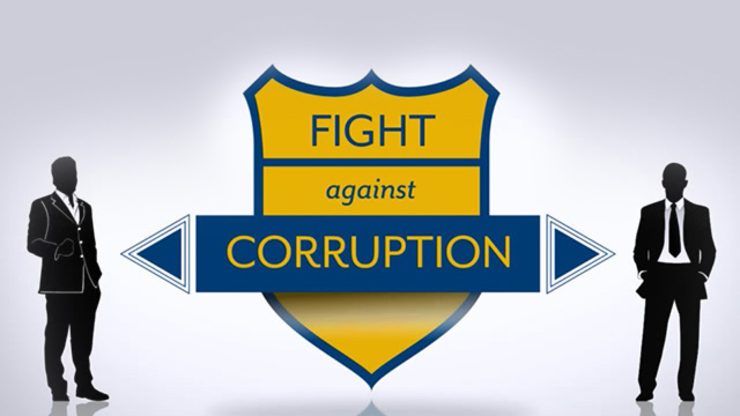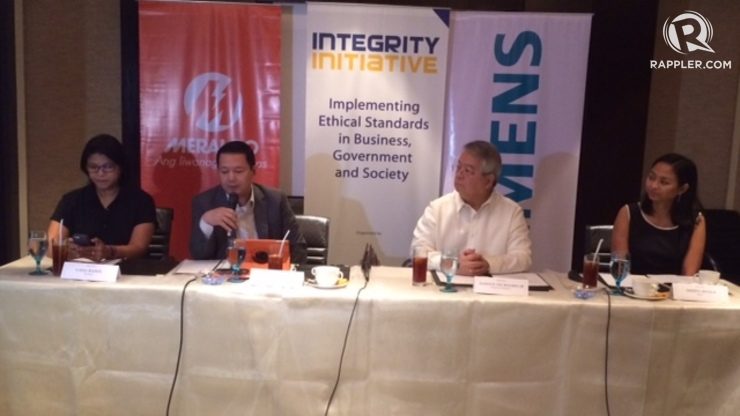SUMMARY
This is AI generated summarization, which may have errors. For context, always refer to the full article.

MANILA, Philippines – For 4 years now, a private sector-led body has been pushing to create a system of certification for businesses that adhere to ethical standards.
The end goal is to promote a “culture of integrity” and an environment where businesses, which are found to be involved in unethical practices, would be denied transactions, Integrity Initiative and Makati Business Club chairman Ramon del Rosario Jr said.
To make the project a success, however, Del Rosario said the Integrity Initiative needs the support of the government.
The group has renewed calls for President Benigno Aquino III to issue an executive order enabling government agencies to make it a requirement for contractors to abide by certain ethical standards before conducting business.
As a result of the Integrity Initiative, more than 2,000 companies, including 42 government offices, have signed up for the integrity pledge, which requires zero tolerance for bribery and a commitment to abiding by a code of conduct for employees.
Two government agencies – the Department of Public Works and Highways and the Department of Education – have required their contractors to sign the integrity pledge before conducting business with them.
Some agencies, however, prefer to have a definite legal framework before implementing the campaign.
“It is important to get government on board to provide recognition. Sometimes, there is a problem that companies who abide by straightforward rules, if people wish to abide by ethical standards in the conduct of their businesses, there are times when they feel they are at a competitive disadvantage if they are competing against other companies who are not so constrained in the way they do business,” del Rosario said.
Del Rosario cited the payment of taxes as an example. Businesses, which don’t pay 12% value-added tax, already have “undue advantage” from others who do, he said.
“It would create a level-playing field to the extent that the govenrment recognizes this and makes it a condition for a business to abide by this (integrity pledge). I think it will encourage more private sector companies to participate in the Integrity Initiative if the government supports this,” Del Rosario added.
Supporting the campaign would also make it easier for the government to weed out unscrupulous contractors, according to Del Rosario.
Signatories to the integrity pledge are encouraged to take the self-assessment test online and use tools that would help them assess, as well as create their own standards for ethical practices.
In 2014, the Integrity Initiative targets to roll out certification for businesses found to adhere to ethical standards. As of September 2014, a total of 12 companies have been validated as “advanced” in terms of implementing such standards.
They are:
- Pilipinas Shell Petroleum
- Siemens
- Development Bank of the Philippines
- Convergys
- Meralco
- Isla Lipana & Co
- GMA Network Inc
- BASF Philippines
- CH2M Hill Philippines
- ING Bank
- Team Energy
- University of San Carlos

How does the Integrity Initiative monitor and assess whether companies are indeed ethical based on the standards set by the campaign? At the moment, the project is still largely anchored on self-assessment and self-monitoring.
Asked whether sanctions will be imposed for signatories who have been found to violate ethical standards, Meralco first vice president William Pamintuan said it is also up to business owners to put value to the campaign.
“The ultimate sanction would be the ability to do business with others,” Pamintuan said.
For now, organizers admit it is up to each member to enforce their own code of ethics. But they also stress this is only a starting point.
Once there is enough number of active participants, the initiative hopes to create an acceditation system similar to an ISO certification or a Seal of Good Housekeeping.
Launched in December 2010, the Integrity Initiative is led by the Makati Business Club and the European Chamber of Commerce of the Philippines, and is funded by Siemens as part of a 2009 settlement with the World Bank with regard to its bribery scandal. – Rappler.com
Add a comment
How does this make you feel?
There are no comments yet. Add your comment to start the conversation.